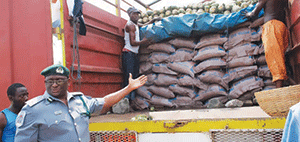Smugglers, whose activities have continued to cripple the nation’s economy, have defied all odds to contravene the Anti-Smuggling Act. Senior Correspondent, ONYEWUCHI OJINNAKA, x-rays the illegality of the deal.

Smuggling is a criminal act. It is illegal importation or exportation of goods. It involves false declaration and concealment of goods, wilful under-payment of Customs duties, trafficking in prohibited or restricted goods, use of unapproved routes and ports, forging of Customs documents and touting in Customs goods and documents.
The illegal act is a drain on the economy of a nation; an economic sabotage.
The menace of smuggling at Nigeria’s land borders appears inexorable despite the untiring efforts of Nigeria Customs Service (NCS) in combating the evil deal. Recently, the situation has increasingly become worse, with some Customs officers losing their lives in addition to the multi-billion naira losses recorded annually.
Smuggling is a worldwide problem and those who engage in it are regarded as economic saboteurs. It could destroy humans and paralyse local industries.
In Nigeria, smuggling has been in existence even with the enactment of stringent laws to combat the illegal trade. Smuggling activities and cargo diversion have been on the increase since the federal government commenced Nigeria’s self-sufficiency programme on rice production, with a 110 per cent hike in import duty on the commodity.
Punishment for the offences under the anti-smuggling act ranges from death sentence to imprisonment, fine and forfeiture. It also prescribes corporal punishment for the minor or remanding in juvenile home. The application of any form of punishment is at the discretion of the court. Despite the prescribed punishment, smugglers are not deterred in their criminal act.
The federal government had banned the importation of certain items to encourage local production and sales. Some of the banned items include foreign textile materials, frozen products, fairly-used tyres, furniture, hard drugs and shoes. In the case of rice importation, it was not totally banned; but in order to discourage the importation, the import duty/tariff was increased.
It is quite unfortunate to note that despite the banning of these items, they are still found in Nigerian markets. No doubt, these products enter the country’s markets through the nation’s porous borders, sea and airports.
Although, the increase in import duty was to discourage importation of the product, so as to encourage local production; but it has instead led to loss of revenue, as importers divert the goods to neighbouring countries with low import duty where they clear and freight the goods by land into the country, with the connivance of some security agents.
Considering government’s existing ban on the importation of such products, one might be persuaded that there is no way such items would find their way into the country.
However, it was observed that with or without ban, tonnes of these items are still found in Nigerian markets on daily basis, irrespective of the presence of the Customs at the Nigerian borders.
In recent times, the NCS seized contraband items from various entry points in the country. The Federal Operation Unit (Zone A) of NCS intercepted about 8,000 bags of rice at Gbaji in the Badagry area of Lagos State. The rice, said to have been shipped into the country through the Atlantic Ocean, was intercepted by the officers and men of the command, based on a tip-off.
The Area Controller of the Command, Adamu Turaki, said: “Ostensibly aware of the implication of being met with the smuggled items, the suspected smugglers escaped through the water on sighting the arrival of our officers who carried out the operation.”
He said efforts are being made to arrest and bring persons behind the unlawful act to book by making them face the full wrath of the law, as a deterrent to others.
“As we enter the middle of the year, I reminded all my officers of the Comptroller General’s zero tolerance for smuggling and other illegalities, while charging them to gear up for the challenges of the period.
“This seizure is a direct message to all that are involved in smuggling that they will not only be recording losses at any attempt, but they stand a great chance of going to jail as we are keen on matching seizures with suspects. Whoever wishes to import rice should do that through the nation’s seaports as approved by the federal government,” Turaki said.
And in Seme, the NCS, Seme-Badagry Command, seized and destroyed smuggled poultry products worth N4 million.
The command’s spokesman, Ernest Olottah, said the seizure was part of efforts to suppress smuggling at the country’s borders.
According to Olottah, “increased enforcement has resulted in various seizures and arrests, including this recent one comprising frozen turkey and chickens which falls under import prohibition.
“While some of the suspected smugglers escaped into the bush at night during the operation, our operatives arrested one of them and also seized a vehicle being used as a means of conveyance of the prohibited items.
“Today, we are destroying these poultry products in compliance with government directives and wish to use this opportunity to warn smugglers to desist from the anti-economic vice and face lawful trade.
“The command has commenced investigations about those behind the smuggling act and to get them to face the full wrath of the law. We are also on the lookout for any individual or group of persons that will dare our resolve by attempting to smuggle through Seme border or any area within our coverage. We will never relent in arresting and prosecuting them in line with our enabling law.”
In Kantin Kwari market in Kano State, officers and men of NCS seized textile materials worth N315 billion allegedly smuggled into the country by Chinese nationals with the connivance of local traders.
In one of the raids in the market, the NCS officials sealed a total of 75 warehouses stocked with textile materials estimated at N315 billion, while some Chinese nationals were arrested.
Speaking during one of his visits to Kano, Comptroller-General of the NCS, Abdullahi Dikko Inde, disclosed that the sealed warehouses contained contraband textile materials smuggled in from China.
“I initiated the raid of the warehouses from my office in Abuja, based on information, in order to salvage our economy. Goods in one warehouse there alone are worth N4.2 billion, and if you multiply that by 75, you will get the worth of the seizure we have made.”
Combating the cankerworm called smuggling at Nigeria’s porous borders has always been challenging, even with the very obvious activities of the NCS, especially the various Federal Operation Units and borders commands and security agencies, the business of smuggling continues to thrive unabated.
Smuggling of goods affects not only the economy of the nation, but local producers. The relevant government operatives and agencies should ensure a water-tight borders, sea and airports. In addition, apprehended smugglers should be made to face the wrath of the law. Let the necessary authorities put their arsenal together in the battle against smuggling because it cripples the nation’s economy which adversely affects the social responsibility of the government to her citizenry.













